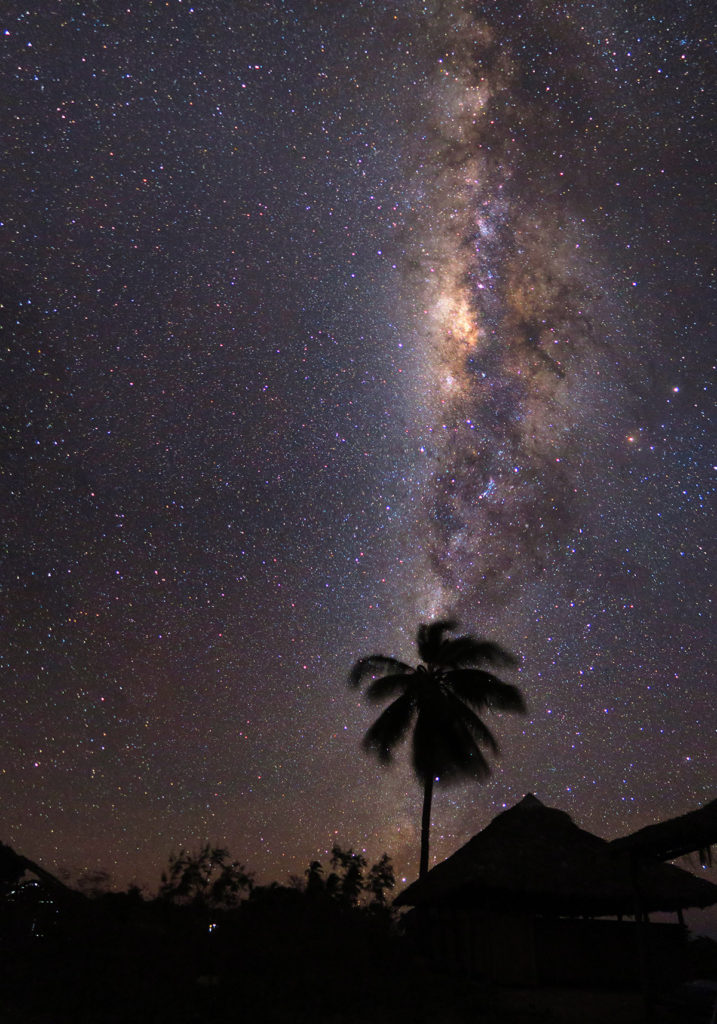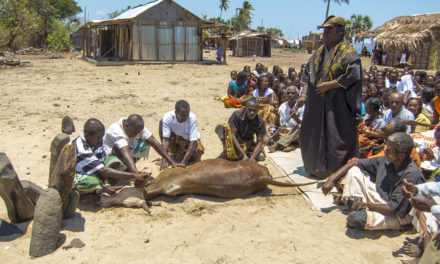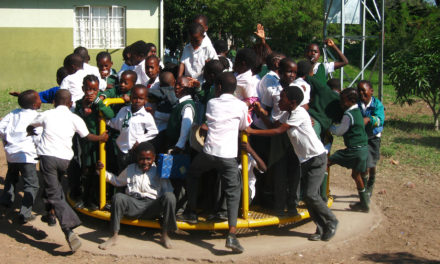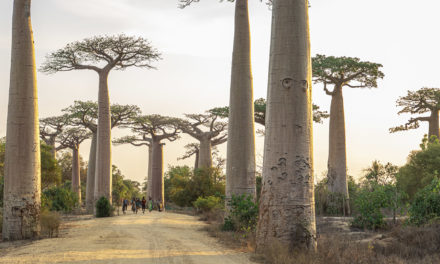I knelt down and put my hand on the young boy’s foot, right next to the gaping wound made from an ax that chopped in the wrong direction. I bowed my head, closed my eyes, and asked God to heal the injured boy. Partway through my prayer, I heard some snickering. When I finished praying, I opened my eyes, hoping to see the boy’s foot healed. Nothing to see. But his mother’s laughter was certainly loud enough and several relatives had also joined in with the giggling. I was disappointed and ashamed. Why were they laughing when I was seeking God in prayer on their behalf?

This is the village where I prayed for the boy a couple years ago. The boy is the one sitting in the front with his foot bandaged (again!). His mom is sitting in the far back. In case you’re wondering, Matimu is drinking coconut juice.
That was the first time I publicly prayed for anyone here on Nosy Mitsio, over two years ago now. I was hoping for miraculous results, for something people could point to and recognize the Creator’s incredible power and intimate love. But instead, all I got was laughing.
Back then I didn’t speak the local dialect very well, and some of the laughing was undoubtedly because of a mix-up in words as I tried to pray in a way the boy and his mom would understand. But later I learned that basically everything about the way I prayed was bizarre to them. And when confronted with such unexpected strangeness, what can a person do but laugh? What better way to disguise and deflect your anxiety over the unknown?
I n the years since, we’ve learned a lot more about the people here and why my first “bold” attempt at public prayer provoked so much laughter. Other than my fumbling within the local dialect, it was just strange to them to see a person sitting in front of them speaking at length with his eyes closed, speaking directly to no one present. Who does that anyway? Certainly not an Antakarana person. Even the whole concept of “prayer” is foreign to them. The only word they know of for “prayer” (for those who’ve been exposed to it) connotates a whole range of foreign religious practices they’re vaguely aware of taking place inside specialized buildings in urban Madagascar. The idea of actually talking to God, and expecting a response, is practically an impossibility in the eyes of an average Antakarana person.
The local word for God literally means “Creator”, and belief in him is universal. People can occasionally go at great lengths expounding on the creative works of God and the height of his power and might. Yet almost as often, people will say, “he can’t be seen with eyes”.
Very often when making plans, considering the future, or hoping for a positive change of events, people will say, “we’re asking God”. It’s stated frequently in many conversations. Yet no one actually takes the next step and literally speaks to God, asking him for anything. When confronted on that point, most just laugh a bit nervously and again say, “we’re asking God”. One lady even expounded and said it would be foolish to wait and rely on God, because he can never respond in a way we can see. To wait and rely on him like that would deserve a big spanking straight from God. She laughed a lot about this idea.
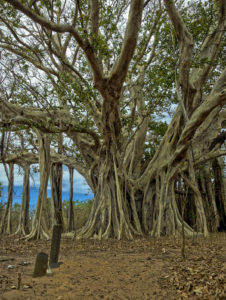
A fig tree with some stones erected for communicating with and offering sacrifices to the Antakarana ancestors.
F or the Antakarana, it’s ultimately their ancestors who direct their actions and their decisions. It’s their ancestors who have been seen by their eyes (or at least by their relatives’ eyes, even if it was a distant past). According to the Antakarana, the Creator has placed their ancestors over them, to direct their daily lives and exercise God’s power that’s been invested in them.
So it’s their ancestors who the Antakarana seek for a practical blessing. It’s their ancestors who they fear, lest they do something the ancestors don’t like and a curse falls on them and their family. It’s their ancestors who are often reluctant to depart from the living and who often choose to possess their descendants, gaining their attention by making them terribly sick, a sickness which no natural remedies can cure. The only way to appease the ancestors is to speak to them directly and sacrifice to them anything they demand. Yet they’ll never leave the body of the one they’ve possessed. Instead of the Creator, these are the ones the Antakarana rely on: fickle personalities no different than the living – but endowed with enough power to destroy the lives of those still living, if they so choose.
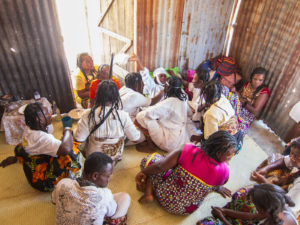
A spirit possession ceremony happening on Nosy Mitsio. The lady has been made sick by the spirit of an ancestor possessing her, and the other ladies are trying to speak to it to determine what it wants.
Nonetheless, there have been a few occasions where we or our team members have seen someone speak at length directly to God. The first time was a man about to die. We almost didn’t realize it was happening. We were sitting there with him in the hut where he was waiting to die, offering hope in Jesus and encouraging him to ask for God’s help. Then he just started speaking. At first we thought he was talking to us, because he was looking in our general direction. His eyes wide open, looking around a bit, he just started speaking to God, asking for healing and blessing, maybe a last-ditch effort on his part. He prayed like this for more than a minute, and just as abruptly as it began, it was done. There was no recognizable difference between this old man’s speech to God and his talking to us.
Another time, a team member was out fishing with a group of guys. One local guy was sitting in the canoe, looking around, and he just started speaking, as if he was speaking to any of the other guys. But he was addressing the Creator and asking for a good catch of fish that day. Again, no noticeable beginning, no noticeable end. Nothing noticeably different. Just a rare occasion where someone really did “ask God” directly.
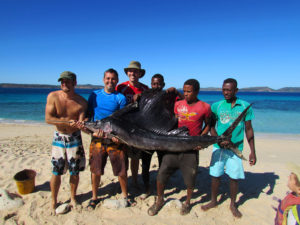
A big sailfish our team caught just after praying that God would help us catch some good fish that day. People talked about this one for a while!
A s we and our team have grown in our language learning and in our understanding of the local culture, we’ve made efforts to identify the Creator God as active and involved even in the mundane aspects of our daily lives. Our longest-running and most persistent efforts have been to introduce to the people around us as much prayer as we possibly can. We publicly pray for every trip we take; we pray for healing for those who are sick and injured; we pray for good harvests and for good catches of fish, for good weather and for distant relatives to return; we pray for God’s Spirit to help us understand, to teach us, remind us, and convict us as we hear his stories. And we publicly praise God when he answers these prayers in ways we can see (and he’s been doing that often). As we pray we acknowledge the character and nature of God as we’ve experienced him in the past and as we’ve learned about him in his stories.
We’ve also learned from my earlier blunders. When we pray publicly, we pray with our eyes wide open, often looking at the people around us or beyond them. We still occasionally get some giggles (after all, it still seems a bit strange or even ridiculous to directly approach the Creator as often as we do), but it’s becoming less and less. As people are seeing God answer some of these prayers, they’re also becoming more interested in the possibility of approaching him themselves – and that’s nothing to laugh about.
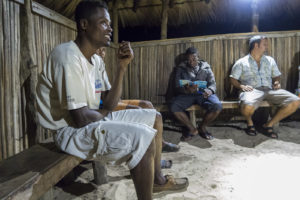
The evening “Discovery Bible Studies” happening in our village. We’ve had some challenges, but it’s so great when people are eager to hear and discuss the stories.
P raying with our eyes open was certainly strange and awkward at first, but we’re getting more and more used to it. I find that even in my personal prayer times, I now pray almost always with my eyes open. I look around at the beauty God has created here and I praise him for it. I see the houses in the village around us, the people walking down the beach to one place or another, and I pray for what God is wanting to do here in their lives, that he would do it soon. I pray for what I can see now, I pray that I would see what God is doing, and I pray that he would do it before the eyes of us all.
As I pray more often like this, with my eyes open to everything around me, I’m finding it harder and harder at other times to pray with my eyes closed. How did we in Western Christianity ever develop that habit anyway? Who says that our eyes should be closed when we pray? I find it interesting that our son Matimu has never developed the habit of closing his eyes when he prays. He’s always kept them open.

The beautiful view from my favorite spot to sit and pray. This is another reason it’s becoming hard to close my eyes when I pray!
These days, if I close my eyes when I’m praying, I often feel like I’m shutting myself off to what God is doing and wants to do in the world around me. It’s like I’m closing myself in. Now that I’ve been confronted with it, I can sense that idea: “God can’t be seen with our eyes.” Especially when I’m praying with my eyes closed, I feel like I’m admitting that’s true. But if I pray with my eyes open, pray directly to God, I can see his established works and also see something of the ones he’s beginning. Sure, I’m also confronted with the often messy realities of life around me – but what better inspiration to pray even more, to seek God more fully! I’m serving and seeking the God who can be seen with our eyes – who presented himself fully in Jesus, for all the world to see.
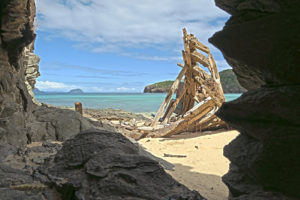
Nosy Lava, an island near to Nosy Mitsio where a couple of us took some guys on a work trip. They said the ancestors of this land would make us deathly ill if we spoke of Jesus here.
P eople here now know for sure that the Creator God that we proclaim and communicate with directly has some distinct contrasts with the one they’re used to mostly avoiding. Some people have stopped gathering to hear the Bible stories we share, afraid that their ancestors may curse them for hearing about and discussing Jesus on this land (the “land of their ancestors”).
When we encourage people to trust in God fully and rely on his responses, they sometimes reply that it’s a nice idea, but it’s just so difficult to trust the one you can’t see. With one young man, I responded that Jesus is the Creator God that you can see with your eyes. This young man has really latched onto that phrase and has been considering it deeply for months now. As he’s asked more questions, he always refers back to that: “Jesus is the God you can see, right?” I believe he’s trying to determine if that’s really a trustworthy statement, if it’s enough to truly find protection from the ancestors. He’s not yet ready to trust, but we’re praying he will be soon.

On Nosy Lava that evening, we spoke of Jesus with our friends anyway, sharing about Jesus’s all-surpassing power that can’t be reached by the ancestors. But because of our friends’ reluctance we didn’t have a Bible study that night.
We share of the God who “was, and is, and is to come,” who has always presented himself before our eyes. (Rev 4:8) We see God as he “was” in the stories of the Bible (times when people have seen God with their eyes, as he’s revealed himself) – and thus we share those stories of his revelation with the people around us, so we can begin to know him. We see God as he “is” in his current works: the beauty of Creation, answered prayers, the gift of his Spirit, and in the Church, his body – and we point people to all these things they can see with their eyes, to know who God is. And we see that God “is to come” in his promises of future fulfillment, in the longing he’s placed on everyone’s hearts for justice and peace – and we offer hope in God’s ultimate promises, something we can just almost see, we feel it on our hearts, but it’s not quite finished yet.
And throughout all this, our God who was, and is, and is to come – is Jesus. In Colossians 1:15-20, it’s written:
Jesus is the God we can see with our eyes, in all times and places, past and future. This is an incredible statement, a trustworthy one. Because of Jesus, we can see God with our own eyes. We can trust in him. We can pray with our eyes wide open, seeing both the beauty and the brokenness of the world around us, knowing that in Jesus we see God’s reconciliation of all things to him.
S o we invite you to please be praying with us. Pray that God would present himself clearly before the eyes of the Antakarana people here, that the one whom they’ve always believed to be invisible and distant would come near and show himself. Pray that God would reveal himself as the God who was (as they hear and discuss his stories from the Bible), the God who is (as they see his created works, see him answer prayers, and see his life in us the missionaries he has sent), and the God who is to come (as they hope for a future free from bondage to their ancestors, and God’s ultimate future free from any bondage). Pray that God would give the Antakarana people dreams and visions of Jesus, that they would literally see his face. This is happening more and more in the Muslim world these days, so please pray that it would also happen here for the Antakarana. Together we pray with our eyes wide open: seeing what God has done, seeing what he’s doing now, and seeking him for what he’s soon to do.
In Christ,
Adam, Lora, Matimu and David

